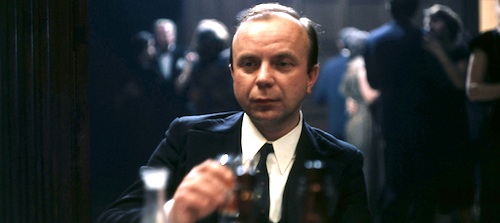By Joe Bendel. During Poland’s Communist era, there was no quicker way to an industrial minister’s heart than a spot of deforestation. Slavishly ambitious Michal Toporny learns this lesson as he rises through the bureaucratic ranks, jettisoning such trivialities as his family and his soul along the way. Not exactly a fable or a morality tale, Grzegorz Królikiewicz’s The Dancing Hawk is more like a visual barrage. It would not be the same film without Zbigniew Rybczyński’s inventive work behind the camera, making it the perfect companion to Gerald Kargl’s Angst during Shot by Rybczyński, the Spectacle Theater’s two-film tribute to the future Oscar winner’s cinematography starting this Thursday.
Hawk’s first twenty minutes or so are like the best cinematic adaptation of James Joyce never filmed. Toporny enters the cold, snowy world during a time of war. He comes from hardscrabble peasant stock, but evidently they were also minor property “holders,” an inconvenient fact that requires Toporny to be more Communist than thou in order to get ahead. He certainly has the necessary moral flexibility, throwing one wife overboard in favor of his politically connected classmate.
This opportunistic pattern of behavior will repeat throughout Hawk. In fact, there are repetitive loops throughout the film, intended to emphasize the Kafkaesque absurdity of the bureaucracy, or perhaps just to make the Communist censors’ heads explode. Frankly, it is rather staggering this one slipped past the state film authorities. Like matter and anti-matter, it seems impossible for Hawk and Socialist Realism to coexist in the same world.

Indeed, as feverish and bizarrely expressionistic as Rybczyński’s cinematography undeniably is, Królikiewicz’s critiques of the Socialist state remain impossible to miss. Central state planning takes it in the shins throughout the film, perhaps even harder than in Frank Beyer’s East German classic Trace of Stones. The Communist Youth of Toporny’s college years are also depicted as foaming-at-the-mouth bullies, who duly grow up to be vicious, petty, in-fighting apparatchiks.
As Toporny, Franciszek Trzeciak is surely small and banal, but he still finds a sad clown pathos within the character, even performing a surreal variation on the old Harpo Marx mirror gag. Toporny’s eventual realization that he has spent his entire life serving a cold and capricious master (much like the protagonist of Andrzej’s Wajda’s Without Anesthesia) is palpably heavy stuff, even with all the madness swirling around him.
Hawk represents incredibly bold filmmaking, in both stylistic and political terms. Defying conventional description, Rybczyński’s cinematography gives the loose narrative a hallucinatory shimmer with an appropriately drab socialist color scheme. A masterwork of protest cinema, The Dancing Hawk is a viscerally defiant product of its time: late 1970’s Poland, an era that would culminate with the imposition of Martial Law. Highly recommended, it screens this Thursday (5/10), Sunday (5/13), and Friday (5/25) as part of Shot by Rybczyński at the Spectacle Theater in the County of Kings.
Posted on May 8th, 2012 at 12:29pm.